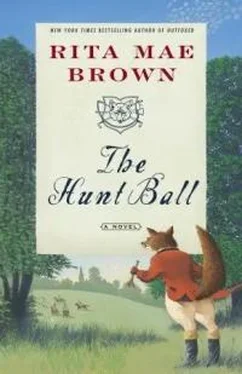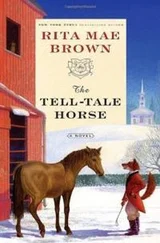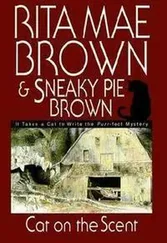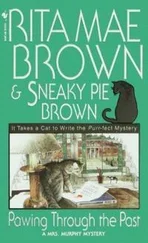Athena’s voice lowered. “And it will be black as pitch on All Hallow’s Eve, beware.”
C H A P T E R 4
The bricks of Custis Hall’s original four buildings around the quad had faded over the two centuries of their existence into a glowing paprika. Mt. Holyoke, founded on November 8, 1837, boasted being the first institution of higher learning for young ladies. But Custis Hall, a preparatory school, predated Mt. Holyoke by twenty-five years. It masqueraded as a finishing school. The girls learned management, mathematics, Latin, French, embroidery (a good hand was considered one of the gracious arts), a smattering of history, and a bit of literature, although the reading of modern novels was discouraged by the administration. Novels were considered racy. A copy of Moll Flanders or Les Liaisons Dangereuses could park a pretty bottom on a hard bench in front of the headmistress.
Charlotte Norton smiled to herself thinking about the history of Custis Hall as she eased off the accelerator, turned right onto the campus, passing through the monstrously large wrought-iron gates, the morning sun hitting the buildings so they shimmered. She never tired of seeing the restrained architecture. She loved her work and felt not one pang of jealousy when her former graduate school classmates moved ever closer to becoming presidents of universities, a few already presidents of smaller colleges. Her passion was secondary school.
She noticed, as she coasted into her parking space, a van with the local TV station’s call letters and number on it. It was parked illegally alongside the main campus road and she had no idea where the campus police might be.
The only vehicles allowed beyond the parking lot were service vehicles. The door to her new Volvo AWD VC70 station wagon closed with a comforting heavy thud. She heard chanting.
Her boot heels clicked as she hurried along the stone path, worn from use, toward the back of Old Main Hall. She’d intended to dash into her office, change clothes, and get on with her day. She’d left her cell phone to charge on her desk and now regretted that decision. Usually she called Teresa Bourbon, her assistant, at least once before reaching her office.
The chanting grew louder. She pulled open the back door to Old Main, the long polished wooden corridor before her.
“Plantation! Plantation! The Custis Hall Plantation.”
“What the hell?” she muttered to herself, noticing, as she raced to her office, that no one was in theirs.
She skidded to her open door, Teresa commanding the anteroom.
“Mrs. Norton, we’ve got a situation.” Teresa met her boss’s gaze levelly as she used the old black expression.
“Jesus, what is going on?”
“There are fifty girls in the Main Hall, one TV reporter, and one print reporter. They have just discovered that Custis Hall was founded by a slave owner.” Teresa, African American, held up her hand, her silver rings shining. “And they are deeply upset by the artifacts displayed in Main Hall.”
A long stream of air blew out of Charlotte’s delicately shaped nostrils, her nose slightly upturned. “I can’t go out there in riding habit.”
“Oh, why not?” Teresa wickedly smiled. “You’ll confirm their idea that you’re the Miss’us.”
Charlotte loved Teresa. They’d worked cheek by jowl for nine years. The thirty-six-year-old woman knew exactly how to handle her. Charlotte flew into her paneled office, ran to the bathroom, shed her jacket, vest, and shirt, grunting as she pulled off her boots with the stand-up boot pull. She yanked a deep carmine cashmere turtleneck sweater over her head. This was followed by a pleated black skirt. She used her coveted staghandle boot pulls to pull up a pair of soft Italian leather boots. She took a very deep breath, then calmly walked out of her office as Teresa winked.
“Don’t you want to witness this?”
“No. Gotta mind the store. If it gets really good, I’ll lock the door and come fetch you home.”
“Oh, Teresa,” Charlotte smiled softly, “I think I’m about to be called a racist pig.”
“Could be worse.”
“I suppose it could.” With that, Charlotte squared her shoulders, lifted her head, and strode to the great entry hall at the front of Old Main.
At the sight of her, students renewed their vigor and volume. Dwayne Rickman, fiftyish, a local celebrity as a TV reporter, moved toward her with the microphone.
She saw the two overwhelmed security fellows, men way past their prime but still wearing a uniform, swing toward him.
Knute Nilsson, treasurer, looked relieved as she took over, as did Alfonso Perez, the director of alumnae affairs. They’d been holding the girls at bay, assisted by Amy Childers, the head of the science department, and her brother, a board member, Christopher Stoltenfuss. Knute, a natural leader, quick-thinking, told the other teachers to stay with their routine, don’t leave the classroom. Amy happened to be coming in for an appointment with Charlotte and simply got caught in the middle. Her brother had come for a meeting with Knute so they felt like deer in headlights.
Al Perez had walked out of his office the minute he heard the chanting. He and Knute worked well together. They had things, more or less, under control. Everyone adored Al, a sunny personality in his early thirties, a new baby at home, career on the upswing. To date, he was the only Hispanic faculty member, and he adamantly pushed for hiring more Hispanic faculty.
“Mrs. Norton, what is Custis Hall doing to accommodate its African-American students?” Dwayne asked politely.
“Custis Hall’s mission is to give each young women a superior education, a grounding for life. Her race, her religion, her class background are irrelevant to that task but relevant to our knowledge of her. We have the highest number of scholarship students of any preparatory school on the East Coast.” As she spoke her eyes swept over the fifty-odd girls. Perhaps one-third of them were students of color; the others, white, appeared even more impassioned than the African-American students. Her Hispanic and Asian students were conspicuous by their absence.
“Custis Hall is the plantation,” Pamela Rene, the ringleader, began the chant.
The others took it up but quieted as Dwayne asked more questions. He signaled his cameraman to cut the lights.
“Mrs. Norton, thank you.” He nodded to her.
Dwayne liked Charlotte Norton. She did a lot for the community. Her husband, Carter, head of neurosurgery at the local hospital, was another tremendous asset. Dwayne had been around long enough to know a setup when he saw one. He’d do his best with the footage he shot to make sure Custis Hall and Charlotte came out ahead.
The print reporter evidenced no loyalty to Custis Hall or Charlotte. He was new to the area and this story held about as much appeal to him as covering brush fires in the county.
“Ladies,” Charlotte addressed the assembled, who did give her the courtesy of silence, “I’d be untruthful if I didn’t tell you I’m surprised. I had no idea you were uneasy about our founder, our beginnings, but as you can see, Mr. Nilsson, Mr. Perez, Mrs. Childers, and our board of directors member, Mr. Stoltenfuss, are in front of you. We’ll listen, but we can’t listen in this setting. A charged subject demands cool heads and a better place in which to discuss the issues.”
Pamela spoke out, pointing to the locked glass cases that contained artifacts of Miss Custis’s life: George Washington’s epaulettes; a dress worn by his wife, Martha; pots, iron skillets, plowshares, old bits. A marvelous carriage, impeccably equipped, sat on a dais in the center of Main Hall. All objects represented the life of Martha Washington’s niece. “Slaves made these things but they get no credit! That’s wrong.”
Читать дальше












